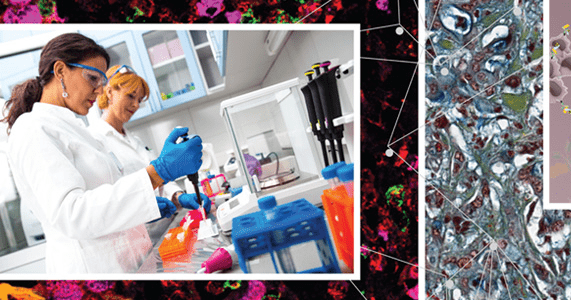On April 14, cancer researchers and clinicians from all over the world, including many funded by or otherwise affiliated with the Cancer Research Institute (CRI), will convene at the American Association for Cancer Research Annual Meeting 2018 (AACR18) in Chicago to discuss the latest basic, translational, clinical, and prevention-focused advances against cancer.
Overall, the work of more than 80 CRI scientists is highlighted throughout the five-day event in the form of over 60 oral presentations (six of which are plenary talks), nearly 100 poster presentations, a prestigious award speech, and a memorial lectureship.
Below are some CRI scientists whose work is featured prominently at AACR18:
- UCLA’s Antoni Ribas, MD, PhD, a leader of the CRI-SU2C Dream Team and a member of the CRI Clinical Accelerator Leadership, gives a main plenary talk on overcoming anti-PD-1 checkpoint immunotherapy resistance while another talk during the clinical trials plenary session will focus on work led by Ribas that evaluated an immunotherapy combination—anti-PD-1 checkpoint immunotherapy and a TLR9 agonist—in a phase 1b trial for patients with advanced melanoma. Dr. Ribas will also be receiving the sixth annual AACR-CRI Lloyd J. Old Award in Cancer Immunology at the conference.
- Johns Hopkins University’s Drew Pardoll, MD, PhD, another leader of the CRI-SU2C Dream Team as well as a member of the CRI Scientific Advisory Council, gives a clinical trials plenary talk on the latest results from a clinical trial that’s exploring the use of anti-PD-1 checkpoint immunotherapy in the pre-surgical, or neoadjuvant, setting in patients with stage III lung cancer.
- Ludwig Cancer Research and University Hospital of Lausanne’s George Coukos, M.D, PhD, who is currently leading an ovarian cancer clinical trial sponsored by CRI’s Clinical Accelerator, gives an opening plenary talk on “mobilizing immunity against ovarian cancer.” Coukos will also be highlighting other insights into ovarian cancer immunotherapy during a major symposium talk.
- NYU Langone’s Leena Gandhi, MD, PhD, who is currently leading two CRI Clinical Accelerator lung cancer clinical trials, gives a clinical trials plenary talk on combining immunotherapy and chemotherapy as a first-line treatment for patients with advanced lung cancer.
- The Icahn School of Medicine at Mount Sinai’s Nina Bhardwaj, MD, PhD—a CRI-funded Clip Investigator, Clinical Team Leader, and member of the CRI Scientific Advisory Council—gives a major symposium talk on personalized vaccine immunotherapies.
- Washington University in St. Louis’ Robert Schreiber, PhD, an associate director of the CRI Scientific Advisory Council and former grantee (multiple times), gives a major symposium talk on “High dimensional analysis of immune checkpoint blockade induced anti-tumor responses.”
- In two separate major symposium talks (here and here), two CRI-funded CLIP Investigators—the Salk Institute’s Susan Kaech, PhD, and Ludwig Cancer Research Lausanne’s Ping-Chih Ho, PhD—discusses metabolic factors that influence anti-tumor immune responses and how to address them.
- University of Pittsburgh’s John Kirkwood, MD, a CRI-funded Clinical Team Leader and member of the CRI Scientific Advisory Council, gives a clinical trials minisymposium talk on a phase Ib clinical trial treating patients with one of two combinations involving anti-PD-1 checkpoint immunotherapy.
- A clinical trials minisymposium talk highlights a combination immunotherapy clinical trial in lung cancer that is led by Moffit Cancer Center’s Scott Antonia, MD, PhD, a CRI-funded Clinical Team Leader.
- Two minisymposium talks (here and here) highlights work led by University of Pennsylvania’s Robert Vonderheide, MD, DPhil, a member of both the CRI Scientific Advisory Council and Clinical Accelerator Leadership. Vonderheide is currently leading a CRI Clinical Accelerator trial testing a CD40-based combination immunotherapy in pancreatic cancer, and both talks will focus on how CD40-targeted immunotherapy can enhance checkpoint immunotherapy’s effectiveness.
- A minisymposium talk entitled “Defined factors overcome T-cell exhaustion via abscopal effect,” highlights work led by Memorial Sloan Kettering Cancer Center’s Jedd Wolchok, MD, PhD, an associate director of the CRI Scientific Advisory Council, chair of the CRI Clinical Accelerator Advisory Committee, and leader of two CRI Clinical Accelerator trials.
- In a “Recent Advances in Diagnostics and Therapeutics Research” session, the National Cancer Institute’s Giorgio Trinchieri, MD, a member of the CRI Scientific Advisory Council, gives a talk entitled about “the microbiome at the intersection of host genetics and environmental cues in cancer.”
- Finally, University of Pennsylvania’s Carl June, MD, a member of both the CRI Scientific Advisory Council and Clinical Accelerator Clinical and Scientific Advisory Committee as well as a former grantee (multiple times), gives a talk on the “scientific and regulatory challenges in development of CAR-T therapy for solid tumors.”
For more on AACR18, follow hashtag #AACR18 for updates and be sure to follow our AACR blog coverage throughout the conference.
